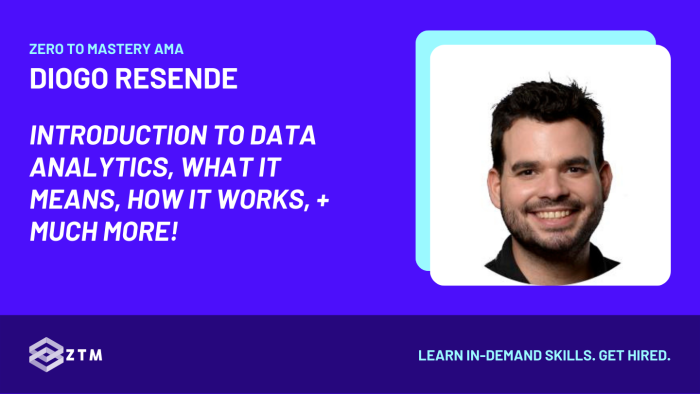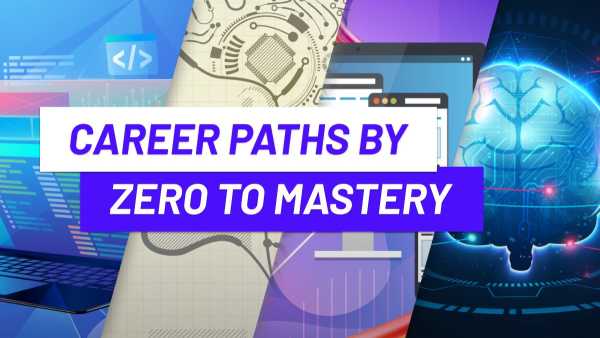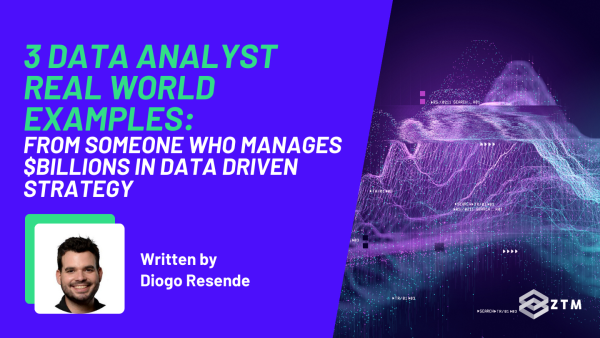A quick note from the editor:
We recently got to join and moderate a live AMA call that Diogo Resende did with our students in the Zero To Mastery virtual campus.

Students and I asked questions about Data Analytics and Business Intelligence: What it is, how it works, how best to learn it, and much more.
You can check out a few of Diogo’s answers to the questions from his AMA call below, but first, let me introduce him.
Who is Diogo Resende, and why should you listen to him?
Diogo is a data science & analytics professional working in Berlin, where he is responsible for the strategy and planning of €4 billion in revenue using data-based decision-making.
€4 billion!
Diogo loves learning complex topics, but more importantly for you, he’s great at explaining those complex topics in a way that is both fun and easy to understand.
Whether it's basic statistics or the predictive analytics that big businesses rely on, he'll help you learn it. And our analytics predict that you're going to love learning with Diogo (and our corny jokes 😉)!
Diogo has an M.Sc. in Management at ESMT Berlin with a focus on analytics. His thesis answered the question of how companies can minimize the inefficiencies in the demand & supply chain that are caused by weather.
Drawing from his vast experiences in the data science industry, Diogo will show you that you don’t need to spend tens of thousands of dollars to get the skills you need to learn in-demand and future-proof skills, get hired, and make a difference.
As the teacher of the Python for Business Data Analytics and Intelligence course here at ZTM, we wanted to chat today about those 2 topics:
- Data Analytics +
- Business Intelligence
It was a great interview so with the intro out of the way, let’s dive into his AMA answers 😀.
🙋AMA with Diogo Resende on Data Analytics & Business Intelligence🙋
Want to watch the video, ask questions in our Discord, or join in live on our next expert AMA?

These are all exclusive access for members of Zero To Mastery. You can find out more details about every course and the other benefits of being a ZTM member here.
What is Data Analytics?
Data Analytics is a process of taking raw input data, and then attempting to glean insights from it that we can use to solve problems or form strategies.
There are 4 levels of data analytics:
- Descriptive i.e what is X? What are the numbers we have so far? What is happening?
- Diagnostic i.e why is this happening? Why is my revenue increasing or decreasing?
- Predictive i.e where will we be if this continues to happen? What will the revenue be in 12 months if this stays the same?
- Prescriptive i.e what should I do then? What is the best course of action?
How does Data Analytics work?
We basically follow these 4 levels to understand what's happening and what we can do about it so that we can make informed data-driven decisions.
Most companies don’t go 4 levels deep. In fact, they often miss the descriptive and prescriptive steps meaning that they don't know their numbers and if they do, they don’t understand them enough to determine what actions to take.
That’s why courses on this can be the make or break factor for startups and SMBs.

What is the general process for Data Analytics?
Again, it’s similar to those 4 levels:
- We start by capturing the original data and diagnosing it
- Then we form an idea or hypothesis of WHY that is occurring
- We look at the current trajectory that we will continue if nothing changes, and finally
- We form a strategy of what we think we can do to fix this, keep this result, or meet other goals
Important:
A key component of effective data analytics is making sure that we capture the correct information. Garbage in = garbage out right?
If we have inaccurate information, then we’ll make bad choices, so you need to make sure that the data you’re collecting is accurate. Only then can you make the right decisions.
For example
Netflix knows their numbers so well, that they know exactly how much a new customer is worth to them, based on how long they stay on average.
This helps them to not only run adverts to bring in new people at a profit, but it helps them plan their budget for new films, and how much new content they need to make or acquire each year, in order to not lose members!
Heck, they even run analytics to tell them which filming locations will run at what potential costs, and have analytics in place to consistently improve their recording and creation process!

How analytics teams should be built
Ideally, you should have both the business team and the data analytics team either working together or have a specialist that understands both.

This is usually what sets apart the forerunners in any industry, as they’re not only tracking and understanding their metrics, but they have a level of understanding of why and how that relates to the company.
For example
Imagine you have a drop in sales and as an analyst, you see that and are looking for reasons why. Was there an issue with the sales page? You might spend hours looking for a technical fault, but as someone who works with the customers and products, you may have a different insight that the analytics team is missing.
Perhaps a celebrity started to endorse a competitor and their bump in sales is a direct cause of the drop in your own?
Or worse? Maybe a celeb shared a bad experience with your product…

This is why joining these 2 departments is so important. You need to understand how to set up the information to get the right data, how to read it correctly, and how to holistically analyze it.
Is Data Analytics difficult to learn?
I think it’s very accessible, as the concepts are not too complex.
If you can commit just 1 hour per day, then you’ll have a solid and applicable grasp of data analytics in 3-6 months. You can shorten this time frame if you can dedicate more time to learning early on.
You definitely don’t need to go to University and spend 3 years learning this. The field innovates so fast and launches new tools and systems, that most University courses are completely out of date.
If you can learn the right information then you can be up and running fast (and not focus on random information that you'll never use on the job, like greek symbols).
Learn how to collect and understand data and you’ll be miles ahead of the competition. This is how I built my course. We skip a good chunk of the unnecessary theory so that you can start learning real-world skills and applying what you're by actually building projects and working through exercises. If you're looking to get hired or use data analytics in your business, this is the way to go. If you're looking to get your PhD or work on hardcore research, then my course won't be a good fit
What is the salary for a Data Analytics professional?
It depends. According to Ziprecruiter the average salary for a standard Data Analyst is $69,971.

However, we teach Data Analytics with Python here at ZTM, and the average salary for a Python Data Analyst is $102,062

Not bad eh?
What is explainable AI in Data Analytics?
Explainable AI in data simply refers to the goal of having a tool that can assess information and help provide insight into where a human might miss.
For example
Most of the big players in the analytics industry have a heavy focus on both Deep Learning and Machine Learning to help get insights across multiple data points. The goal is to both learn more and understand, while also helping to explain to the user what is happening.
This is actually how a lot of ad platforms work nowadays. They assess thousands of data points to find similarities between customers to improve targeting.
The same technology and principles can also be used on your own data set.
What is Big Data?
Big Data relates to the growth in data collection and application in analytics.
A number of the tools we use can capture thousands of touch points around events, which then help give us deeper insights into what is happening and why.
At the same time, however, it also opens us up for errors and false positives, because when we have these incredibly large data sets we start to see connections between events that are not always correct.

For example
If Mcdonald's noticed that a percentage of people who purchased Big Macs also got coffee, would we be correct in thinking that only coffee drinkers buy Big Macs?
Should they then advertise them next to the Coffee Bar or come up with some coffee-based sauce? Probably not right?
Again, this is when having someone from the business side collaborating with the data team will pay off. (It could be that you got a $1 coffee with all Big Mac purchases that month…)
At the same time though, Big Data can help you find information that is vital and you’re missing. British retail store Marks and Spencers found out by testing that almost 50% of their men's underwear was purchased by women!
They spoke to their retailers, surveyed their customers, and found the information was correct but had no idea before then. If they had targeted ads to only men they would have missed a huge segment of their potential sales.
So more data is great, but we just need to be more careful with what we pull from that information.
What does it mean to be Data Driven?
Often referred to as Data Driven Decision making, the goal of being data-driven means that you make almost all choices related to the business, based on data and not gut feelings.
It’s not always easy to do as you need a large data set, but the forerunners in testing and growth are almost always data-driven companies. We mentioned them before but Netflix is incredibly data-driven.
There is a term in testing called HiPPO which stands for “Highest Paid Person's Opinion", which is usually how most business decisions are made in most companies. Data-Driven companies work almost 100% by what the numbers tell them and not the boss!
If you’re making choices by saying things like “I think” or "I feel that" then you’re going off gut instinct.
Being Data Driven, how often do you tell stakeholders that you can’t answer their questions, based on the current data that you have?
Honestly, more than 50% of the time. Usually what happens is they want answers before we’ve had the chance to accumulate enough data to prove what's happening, and not early outliers.
For example
You run a campaign and out of the first 100 people, 60 of them convert.
You might assume as the stakeholder that this is a success, but it’s too small a data set to know if this is simply luck or not. We call this the need for statistical significance. The data size needs to be large or significant enough for us to trust the results now, and when we scale it out in the future.
What is the difference between Data Analytics and Statistics?
As a simplification, Statistics is about analyzing data, whereas Data Analytics is looking at it from a more holistic perspective.
If you remember those 4 levels from early, we want to know what is happening, why it’s happening, where it will take us, and then strategize what we need to do about it.
We’re using similar techniques to ensure the data is accurate, we’re just taking it a few steps further.
What is your favorite aspect of Data Analytics?
Personally, I like to solve problems and find out why they’re happening which of course is one of the main components of data analytics!
Almost all business problems can be solved with data analytics 😁
What is Business Intelligence? Is there a difference between Data Analytics and Business intelligence?
Business intelligence is simply a part of data analytics.
If you remember the 4 levels of data analytics, business intelligence is referring to understanding the data and what it means i.e the descriptive aspect.
🔥 Want to learn more about Data Analytics and Business Intelligence?
If you’re looking to learn more about your own numbers and learn Data Analytics.
Then go ahead and check out Diogo’s course as well as the dedicated Data Analytics Discord channel.
You can ask questions there and get answers and help from Diogo, as well as from other experienced and beginner data analysts.







